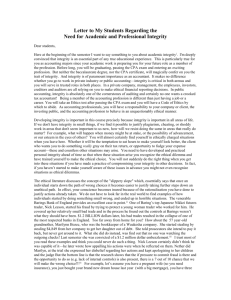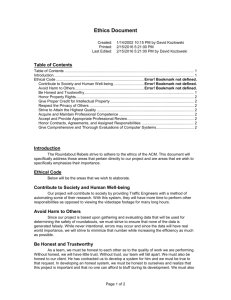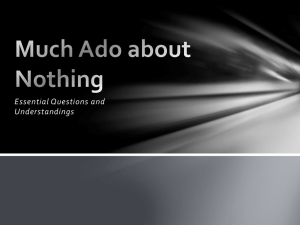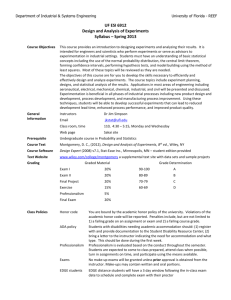2-page proposal file
advertisement
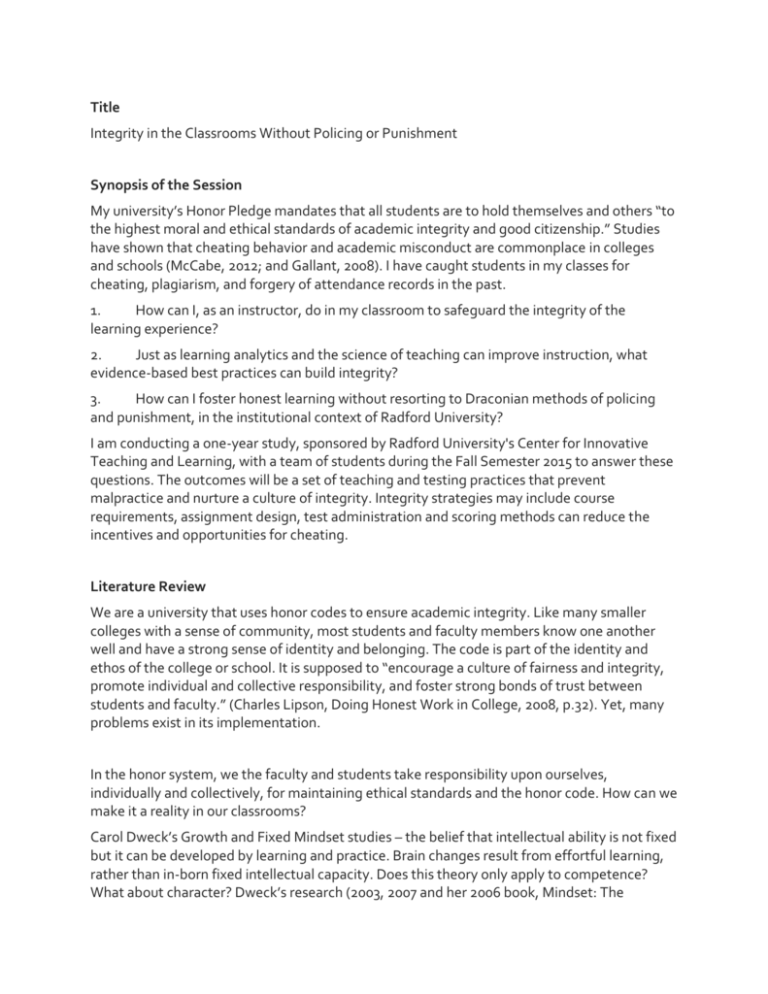
Title Integrity in the Classrooms Without Policing or Punishment Synopsis of the Session My university’s Honor Pledge mandates that all students are to hold themselves and others “to the highest moral and ethical standards of academic integrity and good citizenship.” Studies have shown that cheating behavior and academic misconduct are commonplace in colleges and schools (McCabe, 2012; and Gallant, 2008). I have caught students in my classes for cheating, plagiarism, and forgery of attendance records in the past. 1. How can I, as an instructor, do in my classroom to safeguard the integrity of the learning experience? 2. Just as learning analytics and the science of teaching can improve instruction, what evidence-based best practices can build integrity? 3. How can I foster honest learning without resorting to Draconian methods of policing and punishment, in the institutional context of Radford University? I am conducting a one-year study, sponsored by Radford University's Center for Innovative Teaching and Learning, with a team of students during the Fall Semester 2015 to answer these questions. The outcomes will be a set of teaching and testing practices that prevent malpractice and nurture a culture of integrity. Integrity strategies may include course requirements, assignment design, test administration and scoring methods can reduce the incentives and opportunities for cheating. Literature Review We are a university that uses honor codes to ensure academic integrity. Like many smaller colleges with a sense of community, most students and faculty members know one another well and have a strong sense of identity and belonging. The code is part of the identity and ethos of the college or school. It is supposed to “encourage a culture of fairness and integrity, promote individual and collective responsibility, and foster strong bonds of trust between students and faculty.” (Charles Lipson, Doing Honest Work in College, 2008, p.32). Yet, many problems exist in its implementation. In the honor system, we the faculty and students take responsibility upon ourselves, individually and collectively, for maintaining ethical standards and the honor code. How can we make it a reality in our classrooms? Carol Dweck’s Growth and Fixed Mindset studies – the belief that intellectual ability is not fixed but it can be developed by learning and practice. Brain changes result from effortful learning, rather than in-born fixed intellectual capacity. Does this theory only apply to competence? What about character? Dweck’s research (2003, 2007 and her 2006 book, Mindset: The Psychology of Success)does not specifically address ethical competence, but do her ideas apply? Do students interpret ethical failure as the result of insufficient effort or ineffective strategy? Objectives and Goals The session will present preliminary research findings and seek feedback and ideas on the following questions: 1. What can instructors in their classrooms to safeguard the integrity of the learning experience? 2. Just as learning analytics and the science of teaching can improve instruction, what evidence-based best practices can build integrity? 3. How can we foster honest learning without resorting to Draconian methods of policing and punishment? Description of the Session This highly-participatory, facilitated session is designed to provide a time and space for teachers and researchers to discuss the intellectual, theoretical and instructional issues relating to the topic. How can teachers and researchers comprehensively and pragmatically address the all the risks and responsibilities of managing the honor system in a course? It is hoped that the discourse will offer insights and solutions for educators to shape their classroom practices and curricula. Process of Facilitation and Presentation How will the conversation proceed? – The session will be carried out in 3 stages: 1. Introduction of the session objectives, results of my own study in Radford University, and the topics for small group discussion (15 mins) 2. Have the participants (3-4) at each table or small group discuss among themselves a designated set of questions. Write down key ideas for a representative to present (30 mins) 3. Presentations and plenary discussion of the key ideas and wrap-up summation. (15 mins) Examples of small group questions are: While there are many ideas on how to promote honest learning and uphold an honor system, questions persist on how best to really put them in practice: • Are these ideas and strategies proven to work? • Will these work in a certain classroom and university context? • What would an instructor have to invest to make the honor system work in her class?





